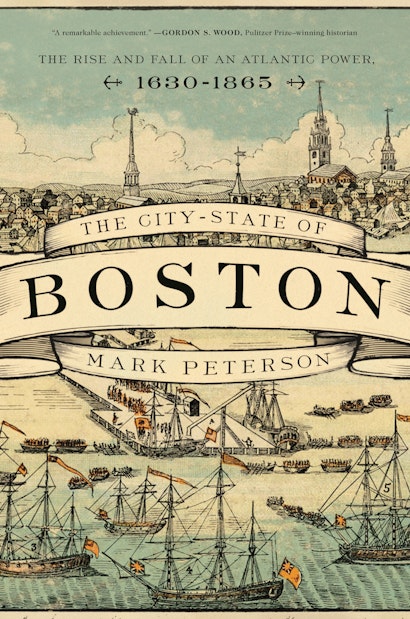In the vaunted annals of America’s founding, Boston has long been held up as an exemplary “city upon a hill” and the “cradle of liberty” for an independent United States. Wresting this iconic urban center from these misleading, tired clichés, The City-State of Boston highlights Boston’s overlooked past as an autonomous city-state, and in doing so, offers a pathbreaking and brilliant new history of early America. Following Boston’s development over three centuries, Mark Peterson discusses how this self-governing Atlantic trading center began as a refuge from Britain’s Stuart monarchs and how—through its bargain with the slave trade and ratification of the Constitution—it would tragically lose integrity and autonomy as it became incorporated into the greater United States.
Drawing from vast archives, and featuring unfamiliar figures alongside well-known ones, such as John Winthrop, Cotton Mather, and John Adams, Peterson explores Boston’s origins in sixteenth-century utopian ideals, its founding and expansion into the hinterland of New England, and the growth of its distinctive political economy, with ties to the West Indies and southern Europe. By the 1700s, Boston was at full strength, with wide Atlantic trading circuits and cultural ties, both within and beyond Britain’s empire. After the cataclysmic Revolutionary War, “Bostoners” aimed to negotiate a relationship with the American confederation, but through the next century, the new United States unraveled Boston’s regional reign. The fateful decision to ratify the Constitution undercut its power, as Southern planters and slave owners dominated national politics and corroded the city-state’s vision of a common good for all.
Peeling away the layers of myth surrounding a revered city, The City-State of Boston offers a startlingly fresh understanding of America’s history.
Awards and Recognition
- Winner of the James P. Hanlan Book Prize, New England Historical Association
"[A] richly detailed history."—New Yorker
"An original and provocative take. . . . [The City State of Boston is] ambitious, fluid and worldly."—Alex Beam, Wall Street Journal
"Peterson leads us through [Boston’s] Enlightenment ideals and how they clashed with the city's links to the American South's slave-driven economy. A meaty, methodical exploration of a crucial American founding stronghold."—Kirkus
"An immense, fresh history of the ‘city upon a hill’ conceives of the place as an independent city-state that was absorbed into the new country that arose around it. Boston’s current moment—at once privileged and peculiar—suggests the value of considering its distinctive past in light of powerful, imaginative scholarship, in the deft hands of the author, now at Yale."—Harvard Magazine
"Remarkable. . . . [A] fresh and original interpretation of colonial New England [and] engagement with what are, in the end, fundamentally moral questions. The City-State of Boston is an engaging blend of small change and big ideas."—John Turner, Patheos
"The most detailed and entertaining history of Boston that’s been written so far."—Steve Donoghue, Christian Science Monitor
"The City State of Boston is a is an ambitious work based on prodigious research. It provides a richly detailed narrative and includes an enormous cast of characters, some of whom will be familiar to readers, though many will not."—Virginia DeJohn Anderson, Times Literary Supplement
"Mark Peterson’s long-awaited The City-State of Boston presents a breath-taking thesis: Boston’s history from its first English settlement through the American Civil War ought to be understood as the rise and fall of an independent city-state. . . . Peterson’s description of the Constitution of the United States is startling."—Mark Valeri, William and Mary Quarterly
"The City-State of Boston will be a landmark in the literature. . . . [It’s a] powerful and compelling story."—John L. Brooke, Journal of the Early Republic
“Mark Peterson’s story of the rise and fall of the city-state of Boston over nearly three centuries is a remarkable achievement. He has told the story in such a rich and extraordinary way that our understanding of Boston’s history will never again be the same.”—Gordon S. Wood, Pulitzer Prize–winning historian and author of Friends Divided: John Adams and Thomas Jefferson
“A daring reworking of the narrative of Boston that Americans have come to know and love, The City-State of Boston may discomfit those who cherish the story of Puritans, revolutionaries, and abolitionists as it has been told. But Mark Peterson’s rich and meticulously researched account will be indispensable reading for everyone interested in the history of North America.”—Annette Gordon-Reed, Pulitzer Prize–winning author of The Hemingses of Monticello: An American Family
“By examining the long rise and eventual eclipse of Boston as a regional power, Mark Peterson vividly and insightfully reflects on the sources and distortions of American nationalism. In this wide-ranging book, Peterson deftly explores the interplay of global commerce with local identities and historical mythmaking.”—Alan Taylor, Pulitzer Prize–winning historian and author of American Revolutions: A Continental History, 1750–1804
“The City-State of Boston is a book of prodigious erudition, which rests on a vast corpus of knowledge about Boston and its regional, continental, national, and international connections. Peterson writes with great subtlety and empathy about people whose mores and meanings were vastly different from our own. A deep and important study, with tremendous sweep and boundless ambition.”—Jane Kamensky, author of Revolution in Color: The World of John Singleton Copley
“The City-State of Boston takes an epic and magisterial look at the rise of one of the great cities of British North America and the early United States. I am confident that historians will be talking about this important book’s argument for years to come.”—Peter C. Mancall, author of Fatal Journey: The Final Expedition of Henry Hudson
"Boston was not 'a city upon a hill,' Mark Peterson argues in his important new biography of the city. It was instead a city-state that dominated its New England hinterland for more than two centuries as it made a distinctive place for itself in the Atlantic world. The City-State of Boston is a major contribution to early American studies."—Peter S. Onuf, coauthor of "Most Blessed of the Patriarchs": Thomas Jefferson and the Empire of the Imagination
"Mark Peterson’s deeply researched, centuries-sweeping The City-State of Boston offers readers a compelling new take on the northern Atlantic port that looms so large in American mythology. This is a biography of Boston from cradle to maturity, and a twenty-first century narrative of decline that, along the way, questions the very value of nationhood."—Wendy Warren, author of New England Bound: Slavery and Colonization in Early America


